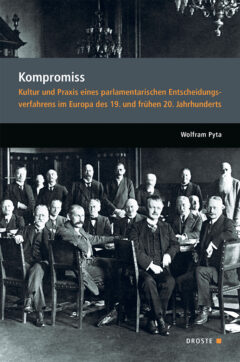Kompromiss. Kultur und Praxis eines parlamentarischen Entscheidungsverfahrens im Europa des 19. und frühen 20. Jahrhunderts / Compromise. The culture and practice of a parliamentary decision-making process in 19th and early 20th century Europe
Compromise as a regulated procedure between actors authorised to make decisions is a sought-after commodity in everyday political life. It is therefore surprising that there are no comparative treatises on the genesis of this decision-making procedure.
This volume provides an introduction to the research field of a comparative European history of compromise since the mid-19th century. It analyses complex negotiation systems in seven European states that were institutionally oriented towards compromise. The interdisciplinary nature of the cross-sectional topic of ‘compromise’ is realised through contributions from sociology, political science and political linguistics. Overall, the volume sharpens our awareness of the fact that compromise required a specific culture of negotiation, which flourished above all in parliamentary representative bodies. Parliamentary compromises were always available when the political language worked towards the compromise and was able to put it into practice.


